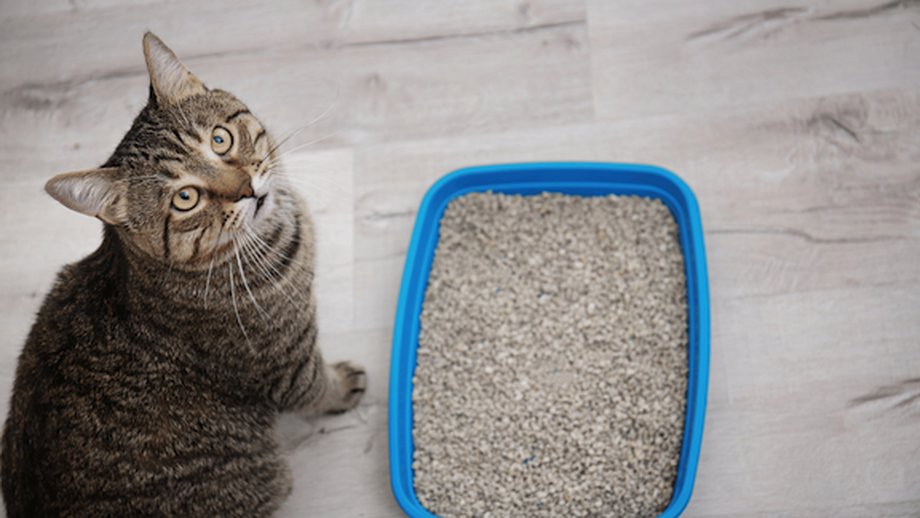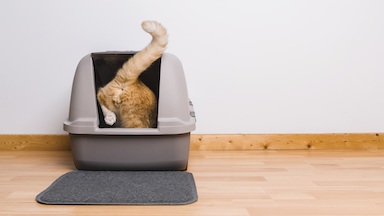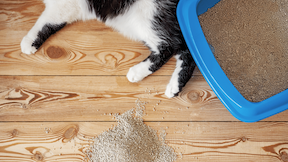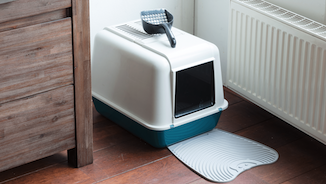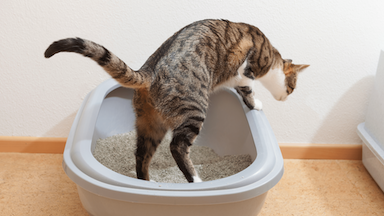As a cat vet I get asked lots of questions about why a cat might start to wee or poo outside the litter box: My cat won't stop pooping on the rug in front of his cat box, what do I do? Help, my adopted rescue kitten has stopped using their litter tray and is peeing on my bed instead! My cat keeps pooing on the bathroom floor instead of going outside... you get the picture!
|
These house soiling kitties all have one thing in common and that's the fact that their social, environmental or medical needs are not being met or all of the above in many cases. Their humans all have one thing in common too - they want the issue to stop, and now! It is not surprising that house soiling is one of the biggest causes of cats being re-homed or abandoned the world over.
No matter how unpleasant you find it, the fact is that the toileting behaviour you find “inappropriate” is very appropriate for your cat. It’s an important clue that something is not right in their world. I'm certainly not suggesting cats are consciously trying to communicate with us directly with their bowels and bladders, just that the behaviour you are seeing is a sign that there is likely to be a bigger problem in your cat's world and it's likely to be complicated so you'll need professional help - so please keep reading! Whether the problem is stress or illness, your cat’s needs are not being met and the issue is likely to continue until they get what they're lacking. So it's important not to take personal offence at your cat's toileting indiscretions (and I know that's hard when you're trying to wash the stench of cat pee out of a duvet... again!). I can't stress enough how vital it is that you keep calm and never punish or yell at your cat - that means no water pistols, loud noises or rubbing their nose in it! Instead what you need to do is take a big breath and channel your efforts into understanding how your cat sees their world. I know first hand how frustrating this situation can be. Even though at times you may be tempted to conclude that it's an act of spite, I can assure you that's not their motivation. It can make a big difference if you make a concerted effort to bring patience, understanding and problem-solving to this often complicated situation! It's something I've been teaching people with cats for years and now my Think Like A Cat Academy of online courses can share my tips and tricks with you too! By wiping the slate clean and committing to bringing patience, understanding and problem-solving to this often complicated situation, together, we can make a big difference to your cat's life! It's something I've been counselling and teaching people with cats I've treated all my working life and I'm so excited to be able to help even more cats and people with my Think Like A Cat Academy of online courses - I can't wait to share my tips and tricks with you too! |
You might also be interested in more popular litter box posts: |
Got a house soiling kitty?
Here's your simple 2-step plan:
Step 1: Always contact your local vet for a checkup and any diagnostics & treatment to try and exclude any pain or illness driving the behaviour.
Step 2: Come back home and hop online with me and learn all about how to Think Like A Cat and resolve those litter box woes once and for all.
Step 1: Always contact your local vet for a checkup and any diagnostics & treatment to try and exclude any pain or illness driving the behaviour.
Step 2: Come back home and hop online with me and learn all about how to Think Like A Cat and resolve those litter box woes once and for all.
Cats have toileting preferences just like we do!
The key is understanding to knowing what these are is learning about their perspective. It's way more than just buying the right litter box and the best cat litter, it's a whole mindset. You really want to make sure you get it right, as it's no fun for either of you when it goes wrong and it's so much easier to prevent problems arising than it is to deal with them once they've started toileting somewhere else.
In an ideal world everyone with a cat would find out what cats consider their ideal litter box experience before they shop for their first cat litter box or update their existing one. In reality though, people end up in the position you're likely to be in, struggling with a cat that doesn't always use their litter box. Your priority now is to make it stop and that starts with learning to understand what has driven your cat to start thinking outside their litter box in the first place and how to persuade them to start using it. This is where I can help you both.
In my Think Like A Cat course I'll run through everything you need to know about preventing and addressing litter box issues in your cat:
- Understanding the possible underlying medical conditions behind litter box issues - such as conditions that cause pain or weakness, through to those that alter the function of the gut and urinary tract and influence the composition of the pee or poo or increase the urge pass it. Think of it as an overview summary of everything that your vet needs to be looking for when you book that appointment.
- My crash course in kitty psychology and how to identify and tackle your cat's worries - this is a massively overlooked problem, especially by some vets sadly! I totally understand that you don't want to contemplate your cat(s) being anxious or stressed out - it's a horrible thought and it makes you feel like someone is suggesting you are somehow a bad cat person. But the truth is, so many cats are stressed out no matter who well we try to give them the best of everything. It's part of living in our modern homes and hectic lives. Cats are just very good at hiding it from you and soldiering on (like all cats do!), until something tips them over the edge. Working out what stresses all cats and then honing in on what's actually stressful for your individual cat, is the most vital part of overcoming house soiling issues.
- Top tips for breaking the cycle of peeing or pooping outside the tray in cats with more longstanding behavioural problems
- A lesson in cat pee-ology and how to succeed in cleaning it up - not just so that you're satisfied it looks and smells clean to you, but critically, to your cat's impeccable standards too.
Litter box issues are actually a big part of what inspired me to set up the UK's first mobile cat clinic, write my book and then go one step further and create my Think Like A Cat Academy. When I opened the virtual doors on my home visiting clinic for cats, I was inundated with all the anxious kitties in the area. Cats and humans alike seemed so relieved and grateful of someone understanding their anxieties about travelling to the vet and that a vet had finally acknowledged that such a niche veterinary service was needed.
By home visiting my clients and their cats, I've not only reduced both of their stress levels, I've also gained a unique and valuable insight that traditional practicing vets miss at their bricks and mortar practice. Physically seeing how cats and their humans from all walks of life actually live together, has allowed me to explain the impact that people's lifestyle and home setup has on their cat's behaviour and come up with simple, effective ways of improving their home's cat friendliness.
Many of my lovely clinic clients came to me having struggled with their cats' lifelong recurrent urinary tract disease. I'm not sure if you know, but urinary tract diseases are one of those catch-22 situations, because unless you have a mobile cat vet, you need to take your cat to the vet to have them assessed and treated, but then that ordeal in itself is immensely stressful for an already anxious cat. Stress is the last thing any cat with urinary tract issues needs because that's often a big trigger for the problem. It's a vicious circle.
Interestingly, I began to notice that once house-soiling cats started experiencing the benefits of my home visiting clinic advice and care, most never had the problems again. And the few cats that did, had humans that had just slipped into their former not-so-cat-friendly ways and needed a bit of a #ThinkLikeACat refresher session ;-). It then dawned on me, that by taking the time to tutor and encourage my clients to think like a cat (and specifically understand their individual cat) as a routine part of my vet visits, I'd succeeded in stopping their cat's urinary tract disease and litter box "misdemeanours" altogether.
And it wasn't all about improvements with litter box issues - great things started to happen in other areas of these cats' health and wellbeing too! Lots of other tricky behaviours subsided like unwanted furniture scratching, food gobbling and regurgitation, squabbling between cats, lashing out at visitors and more. In some ways, it's not rocket science, we all get worn down, frustrated and cranky when we're feeling anxious, frustrated or sad that our needs aren't being met. If this continues longterm then both humans and cats are more likely to suffer with stress-related illnesses like cystitis, viral infections and many other health conditions.
So learning my Think Like A Cat mindset can truly revolutionise your cat's litter box issues. But that's not where the benefits stop. It can transform every aspect of your cat's everyday life with you too - from how they eat, drink, sleep, play, groom, socialise and more. Learning to Think Like A Cat can have such an incredibly positive effect on a cat's health and happiness. Let me show you what it can do for you and your cats.
By home visiting my clients and their cats, I've not only reduced both of their stress levels, I've also gained a unique and valuable insight that traditional practicing vets miss at their bricks and mortar practice. Physically seeing how cats and their humans from all walks of life actually live together, has allowed me to explain the impact that people's lifestyle and home setup has on their cat's behaviour and come up with simple, effective ways of improving their home's cat friendliness.
Many of my lovely clinic clients came to me having struggled with their cats' lifelong recurrent urinary tract disease. I'm not sure if you know, but urinary tract diseases are one of those catch-22 situations, because unless you have a mobile cat vet, you need to take your cat to the vet to have them assessed and treated, but then that ordeal in itself is immensely stressful for an already anxious cat. Stress is the last thing any cat with urinary tract issues needs because that's often a big trigger for the problem. It's a vicious circle.
Interestingly, I began to notice that once house-soiling cats started experiencing the benefits of my home visiting clinic advice and care, most never had the problems again. And the few cats that did, had humans that had just slipped into their former not-so-cat-friendly ways and needed a bit of a #ThinkLikeACat refresher session ;-). It then dawned on me, that by taking the time to tutor and encourage my clients to think like a cat (and specifically understand their individual cat) as a routine part of my vet visits, I'd succeeded in stopping their cat's urinary tract disease and litter box "misdemeanours" altogether.
And it wasn't all about improvements with litter box issues - great things started to happen in other areas of these cats' health and wellbeing too! Lots of other tricky behaviours subsided like unwanted furniture scratching, food gobbling and regurgitation, squabbling between cats, lashing out at visitors and more. In some ways, it's not rocket science, we all get worn down, frustrated and cranky when we're feeling anxious, frustrated or sad that our needs aren't being met. If this continues longterm then both humans and cats are more likely to suffer with stress-related illnesses like cystitis, viral infections and many other health conditions.
So learning my Think Like A Cat mindset can truly revolutionise your cat's litter box issues. But that's not where the benefits stop. It can transform every aspect of your cat's everyday life with you too - from how they eat, drink, sleep, play, groom, socialise and more. Learning to Think Like A Cat can have such an incredibly positive effect on a cat's health and happiness. Let me show you what it can do for you and your cats.
** IMPORTANT NOTE **
If your cat's going in and out of their litter box (or your garden beds) more frequently, or they're repeatedly licking their genitals, then they may be having difficulty passing urine. Your cat may seem agitated, distressed and be trying to urinate outside the litter tray in unusual places too. These cats need URGENT veterinary attention, particularly male cats!
Blocked urinary tracts can cause the toxic build up of kidneys wastes in a cat's bloodstream, permanently damage the kidneys and can rupture the bladder. In other words it's pure agony! If you're in doubt, always call your vet even if it's 2am (!)
Blocked urinary tracts can cause the toxic build up of kidneys wastes in a cat's bloodstream, permanently damage the kidneys and can rupture the bladder. In other words it's pure agony! If you're in doubt, always call your vet even if it's 2am (!)

